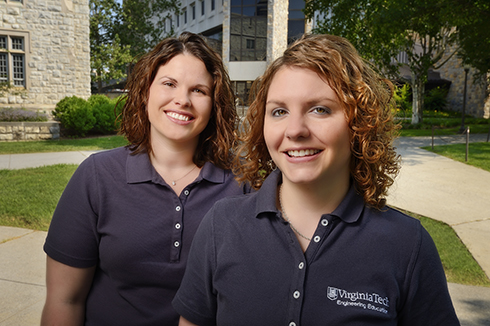Governor's Award nominees Marlena McGlothlin-Lester and Natasha Smith recognized for streamlining the advising process

Marlena McGlothlin-Lester and Natasha Smith began working as academic advisors in the College of Engineering in 2010. Together, they co-advise about 2,100 general engineering students on academic, career, and personal issues, allowing other college faculty to pursue additional research and teaching improvements.
"Since joining our department, they have been instrumental in the creation, implementation, and streaming of our advising and orientation activities, and in the process have become invaluable to our department," said Stephanie G. Adams, professor and department head.
According to Adams, McGlothlin-Lester and Smith have made significant contributions to the department's advising efforts, specifically regarding freshman orientation, the major change process, and electronic filing.
“It is impossible to think of one of these ladies without the other, such is their constant approach to teamwork in an effort to better perform their jobs and aid their students,” said Christi L. Boone, director, academic support services. “Though their tenure in the college is relatively short, they are often called upon to answer questions by the other more seasoned advisors in the college.”
Freshman orientation, a long-standing program in engineering at Virginia Tech, received significant upgrades under McGlothlin-Lester and Smith's direction. From an extensively detailed Web page targeting new freshmen, to a hands-on group-advising session while on campus in July, to a large group "welcome" meeting immediately prior to fall classes, to "special interest" information sessions assisting with registration (targeted toward, for example, cadets, whose military commitments combined with an engineering schedule leave little room for error) both women work together to make the orientation experience something larger than a two-day campus visit.
Cost savings under their direction are innumerable with the elimination of bulky handouts (which had to be copied, collated, and transported by paid summer staff -- now neither the paper nor the extra staff are required), but the overall feeling of orientation has changed from one of a military type "follow this path or you will fail" structure to one of a burgeoning relationship between advisor and advisee.
McGlothlin-Lester and Smith are not afraid to tackle "old" problems. Viewing the college's 15-plus- year-old change of major process, they volunteered to assume responsibilities for the task (for which they had no responsibility when hired) in an effort to create a streamlined, easier-for-the-student procedure. Note this wasn't a small job for which to volunteer, as they now have responsibility for processing 2,500+ engineering major changes annually.
Further adding to cost-saving measures, they moved the process to an entirely online application and review, publishing clear information on the process and application deadlines online year-round. The end result is a streamlined, unified system for students to change into engineering major(s).
Always looking for ways to reduce "paper," McGlothlin-Lester and Smith created an electronic filing system for student files (making sure to adhere to FERPA regulations for storage and access of records). Their system quickly caught the interest of many of the other 13 departments within the college, and soon they were teaching other departments (in our college and throughout the university) how to convert records to a university-approved online storage system.
Such are their efforts that the College intends to pilot a university-wide electronic filing system within the 2013 year, saving endless hours of duplication and filing time (and reams of paper).
“Their willingness to always assist, always keep the student's best interest and ease of transition in mind, and their general likeability are a major asset to those of us fortunate enough to work with them,” said Boone.
“Our department is very fortunate to have a team of employees of such high caliber and dedication; their efforts have had a positive effect on 2000 students per year and have created more efficient and effective processes,” said Jenny Lo, chair, Department of Engineering Education’s Faculty Honorifics Committee.
Dedicated to its motto, Ut Prosim (That I May Serve), Virginia Tech takes a hands-on, engaging approach to education, preparing scholars to be leaders in their fields and communities. As the commonwealth’s most comprehensive university and its leading research institution, Virginia Tech offers 240 undergraduate and graduate degree programs to more than 31,000 students and manages a research portfolio of $513 million. The university fulfills its land-grant mission of transforming knowledge to practice through technological leadership and by fueling economic growth and job creation locally, regionally, and across Virginia.




